- Home
- Marjorie Farrell
Red, Red Rose Page 4
Red, Red Rose Read online
Page 4
“I know a little of your story,” continued the marquess. “I am sure you wish to stay, both for Charlie’s sake and your own.”
Val nodded.
“Then ignore the bastard.”
Val flinched at the word. He couldn’t help himself.
The marquess decided to ignore it. “Now let me look at you. What do you think, Henry?”
“He could have walked into a door.”
“It is too bad we can’t come up with anything better than that old saw,” said the marquess with an ironic smile, “but I suppose it will have to do. Now, what do you think the head will say about Stanton walking bent over his balls?” asked the marquess, an eyebrow lifted inquiringly.
Henry and the marquess laughed aloud and, after a moment’s hesitation, Val joined them. For the first time since arriving at the Hall, he felt a sense of camaraderie.
* * * *
Val was sure the teachers knew what had happened, but since no one, especially the two combatants, was willing to tell, nothing happened except for a few weeks of being under very close scrutiny. The next Sunday Charlie told Val that the younger boys had taken great satisfaction, especially when Val had attacked Stanton’s privates.
“Stanton has never, er, bothered you, has he, Charlie?” asked Val, suddenly worried about his brother. “You know what I mean?” he added, not wanting to have to put it into words.
“He wouldn’t dare. I’d kick him right where you squeezed him!”
* * * *
For the Christmas break both boys returned to Faringdon and the pattern that had been set during the summer continued. Val was polite to his father, spoke when spoken to, but kept his distance, and the earl wondered if he would ever be able to form a relationship with his oldest son. It seemed the only thing they had in common was their love for Charlie.
Val had managed to slip off from time to time into the village and had convinced the local blacksmith to let him use the forge. He had fashioned Charlie two small wrought-iron bookends for Christmas and was embarrassed at the pleasure and surprise in Charlie’s eyes when he opened the heavy parcel.
“They are splendid, Val!”
“Indeed they are,” agreed the earl, admiring the workmanship and thinking how very odd it was a son of his had been a smith.
“George was a good teacher, if a hard one,” Val said gruffly.
One of Charlie’s presents to him was an illustrated copy of Ovid’s Metamorphoses. “I thought you might like something more enjoyable than a grammar.”
“I doubt that I have enough Latin to make it out,” said Val as he paged through the book. “I never did get much beyond conjugations, but thank you, Charlie.”
* * * *
Returning to the spartan atmosphere of Queen’s Hall was difficult after three weeks at Faringdon. The school was big and ill-heated and half the boys at any one time were suffering from coughs and sniffles. One Sunday, when Charlie was one of those in bed with a cold, Val decided to go for a walk across the neighboring fields. He had a good long tramp and was within a mile of the school when he met the Marquess of Wimborne.
“You look like you had a healthy walk, Aston,” said the older boy with a smile.
“And you too, my lord.”
“Please call me James.”
“Then you must call me Val.”
“How was your holiday, Val? You spent it at Faringdon?”
“Very enjoyable, my lord. I mean, James. In fact, I was surprised at how difficult it was to return.”
“This was your first holiday there, wasn’t it? Do you and your father get along?”
“The earl can be very pleasant,” Val answered stiffly.
It did not escape James’s notice that Val had referred to his father by his title, but he decided to ignore it. “Fathers can be most difficult. Mine is determined to marry me off to recoup the family fortunes. Oh, not immediately,” said James, responding to Val’s look of surprise. “But he would love to celebrate a betrothal in the next few years. There is a suitable girl, old friend of the family’s, excellent dowry…that sort of thing.”
“You don’t care for her, then?”
“I don’t dislike her. But I haven’t met any woman I would wish to marry.” There was an undertone of sadness in James’s voice that took Val by surprise. He wondered what such a privileged young man had to be sad about.
“I saw you in the library with your grammar out, swotting away. I thought you had given up on Latin,” teased the marquess.
“Charlie gave me a copy of Ovid for Christmas, but I find it hard going.”
“I’d be happy to help you with it. Come up to my room tonight for some chocolate and we’ll see what we can do.”
* * * *
Val had received so little affection in his life and had never had a close friend, that it took him a while to open up to James’s overtures, but gradually they fell into a routine of tramping the moors together every week, no matter what the weather, and warming themselves up later with tea or chocolate and whatever they could cadge from the tea table. Val did not become one of the marquess’s intimates, of course. He was two forms below him, after all. But their friendship was genuine nevertheless, although Val could never understand why someone of James’s rank would be drawn to an outsider like himself. He developed an affection for the older boy that was close to rivaling his feelings for Charlie, although he would have had a hard time expressing either.
* * * *
In March, the boys were thrilled to discover that a recruiting regiment had arrived in the village and on their visits to town, the younger boys especially were enthralled by the recruiting sergeant’s speeches outside the local pub.
“Poor bastards,” said James one day as they watched some of the local men sign up. “They are nothing but ‘food for powder.’ ”
Val had seen recruiting regiments in Westbourne. “But at least they’ll have food in their own bellies before they feed the guns. Most men who sign up are poor laborers or vagrants, you know.”
“Or men who would otherwise be transported. Have you ever considered the army, Val? I’m sure the earl would purchase you a commission if you desired it.”
“He seems to have either the law or estate management in mind for me, James. And with my Latin, I think it will be the latter!”
* * * *
Between Val’s humiliation of him and James’s protective friendship, Lucas Stanton had stopped his harassment except for an occasional whispered insult in the halls that Val could easily ignore. Although he still did not feel like a Queen’s man, he was surprised at how he was beginning to enjoy his spring term and was even looking forward to his second year.
Then he caught Lucas Stanton with Marcus Towle, a cherubic nine-year-old. He and Charlie had been passing by the barn one Sunday afternoon when they heard crying.
“Go on, Charlie,” said Val, “and I’ll find out what it is.”
“I’ll go with you,” Charlie protested.
“No, you just get yourself to evensong on time.”
Lucas Stanton was just coming out of one of the back stalls, buttoning up his trousers. He looked surprised to see Val, but only gave him a leer and a smile as he passed by, saying, “If you want some, Aston, he’s all yours.”
Marcus was huddled in the corner of the stall, weeping heartbrokenly, his face buried in his hands. Val knelt next to him and put his hand gently on the boy’s shoulder. “Are you all right, Marcus?” The younger boy shrank against the wall. “I’m not going to hurt you,” Val reassured him. “What did he do to you?”
“He made me….” The boy wiped his mouth with the back of his hand. “He made me…take it in my mouth—”
Marcus turned and retched into the straw while Val patted his back awkwardly.
“I didn’t want to,” the boy sobbed after he’d stopped heaving. “Truly I didn’t. I know some boys who might, but I didn’t.”
“It’s all right, Marcus, I understand.”
“He’s
been after me all spring, but I managed to keep out of his way until today.”
“Can you stand up? He didn’t do, er, anything else to you?”
The boy pulled himself up, looking blankly at Val, obviously still unaware that anything else might have befallen him, so Val just patted him again on the shoulder. “All right, then. Why don’t you tell your prefect that you don’t feel well, and sleep in the infirmary tonight.”
The boy shivered. “I don’t feel well. I think I shall do that.”
Val caught up with Stanton outside the chapel.
“Stanton,” he called.
Stanton only looked over his shoulder and, whispering something to his comrades that made them laugh, walked on.
“Are you afraid of me, Stanton?” Val called.
Stanton had to stop then. “Afraid of you? Hardly. What is it, Aston? Little Marcus not give you as much pleasure as you thought?”
Val thought his head might explode at the strength of the fury that flowed through him. He ran at Stanton with all the force of a battering ram and, just as Stanton turned, brought him down. This time, there was no contest. Val was on top of Stanton, trying to drive his face into the ground, when two of the teachers managed to pull him off.
“Aston, get yourself to your room and stay there till you are sent for. Is Stanton all right?”
“He’s been beaten unconscious, sir,” said one of Lucas’s friends.
* * * *
Val was still trembling when he was finally summoned to the headmaster’s office.
“Lucas Stanton is missing two teeth and has a possible concussion. What have you got to say for yourself, Aston?”
“He…he….” Val couldn’t think of the right words.
“He made Marcus…give him pleasure, sir,” he finally choked out.
“Well?”
Was that all the head could say? Well?
“Well, what, sir?”
“Was there any other excuse?”
“Marcus is a nine-year-old boy, sir. Lucas Stanton violated him.” Finally he had found the right word.
The headmaster looked down at his desk. “Yes, that does happen from time to time. Boys living together. Young men being what they are. It is no excuse for near murder.”
“Young men being what they are?” Val’s fury, which had died down, flamed up again. “Where I come from, young men don’t do that. If they tried it, they’d be run out of town on a rail. Sir.”
“I am sure that laboring men have the same urges, Aston,” the head said disdainfully.
“Having urges is one thing. Forcing yourself on young boys or girls is another.”
“It may not be right, Aston, but it happens.”
“And you just pretend it doesn’t? Just pretend Marcus wasn’t sitting on the barn floor, puking his insides out?”
“He’ll get over it in time. Boys do.” They were both silent and then the head sighed again. “I shall have to dismiss you for this, Aston. I am sorry, for despite your, uh, unfortunate background, you seemed to be adjusting, but I can’t overlook this.”
Val gave him a disgusted look. “Don’t worry, sir. I’ll be out by morning. I don’t want to adjust to such goings-on as this.”
James was at the end of the hall, waiting for him.
“I am sent down. But I’d have had to leave anyway,” Val told him.
“What happened?” James asked him quietly.
“I found Marcus in the barn. He was throwing up what Stanton had made him swallow,” Val said harshly.
“Oh, God,” said James.
“Yes. Well, I understand that this does happen here from time to time, this violation of innocence,” said Val with savage irony.
“Most of the boys learn how to stay out of Stanton’s way.”
“I am not sure what I think about the boys who are clearly made this way,” said Val, “but I can’t accept this kind of perversion.”
“Lucas Stanton isn’t made that way, you know,” the marquess commented quietly.
Val looked over at him with surprise.
“He’d bugger a sheep if he couldn’t find anything else,” James added with a wry smile. “He just enjoys hurting those weaker than himself. I pity the woman he marries.”
“Then that is the real perversion, James.”
“It may be, Val, but it will never be seen as such. Not amongst gentlemen, at any rate,” he added sarcastically.
“Then I am glad I am not one of you.”
“Ah, but in some ways you are, Val. What will you tell your father?”
“The truth,” Val replied shortly. “Or nothing. I haven’t decided yet what I am going to do.”
“Why, what can you do but go home to Faringdon?”
* * * *
“Go home to Faringdon” was the last thing he could do, thought Val as he packed his books. Charlie would still be at school and the earl would surely not want him at the hall. Home. He wished he knew where home was. It seemed to him he hadn’t had a real home, one where love and affection reigned, since his mother died. The earl and Charlie loved each other. But the bastard son was only there because he made Charlie happy.
He certainly could not, would not, count George Burton’s house as home, no matter how his aunt wanted him to think so. So the question before him was how he was going to make his living. Perhaps if he showed up, George might take him on as a partner. And pigs would fly! He supposed he could tramp around Devon looking for a smithy, but most men would already have apprentices. He had no money to set up on his own, although he knew he could eventually make a good living at it. If he asked the earl…? He laughed out loud then. He could not ask the earl for anything, not the man who had rejected him for so long.
He sat on the edge of his bed, wondering where he would go, his bag packed, his head in his hands. After a while he became conscious that a plaintive tune was running through his head, a tune he knew from his mother’s singing to him in childhood. Now, why had that song come back to haunt him? And then he remembered. In the town a week ago, one of the men accompanying the recruiting sergeant had been singing it. Well, singing the same tune, but the words were different:
“There’s forty shillings on the drum
for those who volunteer to come…”
He’d forgotten the verse, but remembered the chorus:
“O’er the hills and o’er the main
In Flanders, Portugal, and Spain
King George commands and we obey
Over the hills and far away.”
The man had sung it in that deep baritone that country folk used and although the man had only sung three verses, they led you on, the last notes not bringing the verse to an end, but going up instead of down, as though promising something: another verse, another sea to cross, another battle to fight before the song was over.
Suddenly he knew what he was meant to do. He would go for a soldier. He would follow that imaginary “father” of his into the army, just the way he had dreamed he would when he was a boy. And the Earl of Faringdon be damned.
Chapter 1
Lisbon, 1810
Elspeth Gordon looked herself over in the pier glass and then gave her shoulders a little shrug as if to say, “I have done the best I can.” She knew her dress, two years out of date, would not help. The wives and daughters of the Portuguese officers and diplomats would easily outshine her, with their satins and silks and black lace. And the few Englishwomen at this supper were new arrivals and, no doubt, had trunks full of the latest fashions.
And all of them, no matter how they were dressed, would be smaller than she was, thought Elspeth with a smile as she bent her knees to get a better look at her hair in the glass. She smoothed back a few strands that had escaped the knot she had twisted and secured with a silver pin.
She shrugged again at her reflection and said, “Ah, ma wee lass, ye’re a sight for sore eyes,” which was how her father always greeted her. And she added, with a twinkle in her hazel eyes, “Handsome is as handsome d
oes, Elspeth,” which was one of her mother’s favorite sayings. “Now, Elspeth,” she reminded herself, “everyone is here for Maria’s birthday and not to see you. Your gown may be two years out of date, but it was fashionable at the time and it brings out the green in your eyes.
Fortified by that thought, she threw a shawl of soft white wool lace over her shoulders and went downstairs to join her hosts.
* * * *
Elspeth Gordon, daughter of Major Ian Gordon and his wife Margaret, was in no danger of being ignored at a supper dance. She had come over to Portugal a year ago after finishing what she considered a tedious two years at Mrs. Page’s School for Young Ladies. Her parents had offered her a Season, but she had refused. “After all those years in India, Mama, I just don’t fit in. Truly, all I want is to join the two of you.”
Had Elspeth been small and conventionally beautiful, perhaps her parents might have insisted upon a Season for two good reasons. One, had Elspeth combined beauty with her wit and spirit, a Season would no doubt have seen her married, if not blissfully, at least happily. The second reason was that bringing a Pocket Venus to live amongst the officers of Wellington’s army would have been like setting a cat among pigeons. Or perhaps a pigeon among cats, as her mother had said.
As it was, Elspeth was very popular amongst the officers precisely because she was not an Incomparable. With the exception of her years at school, she had lived all her life in the army, for her mother had declared at the beginning of her marriage to the then-Lieutenant Gordon that she refused to sit home weeping and waiting either for his infrequent returns or a letter that announced he would never return at all.
Margaret Gordon’s family had protested her decision as they had protested her marriage to a man who was the son of a Scottish vicar, while she was the granddaughter of an earl. But Margaret ignored their protests, determined to follow her husband wherever the army might send him, and she had never regretted her decision.

 Heartless Lord Harry
Heartless Lord Harry Journey of the Heart
Journey of the Heart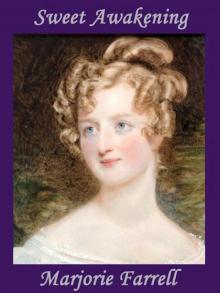 Sweet Awakening
Sweet Awakening Desert Hearts
Desert Hearts Jack of Hearts
Jack of Hearts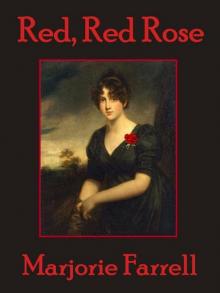 Red, Red Rose
Red, Red Rose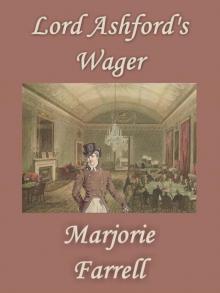 Lord Ashford's Wager
Lord Ashford's Wager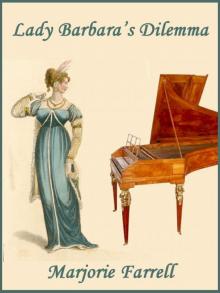 Lady Barbara's Dilemma
Lady Barbara's Dilemma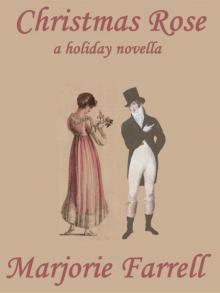 Christmas Rose
Christmas Rose